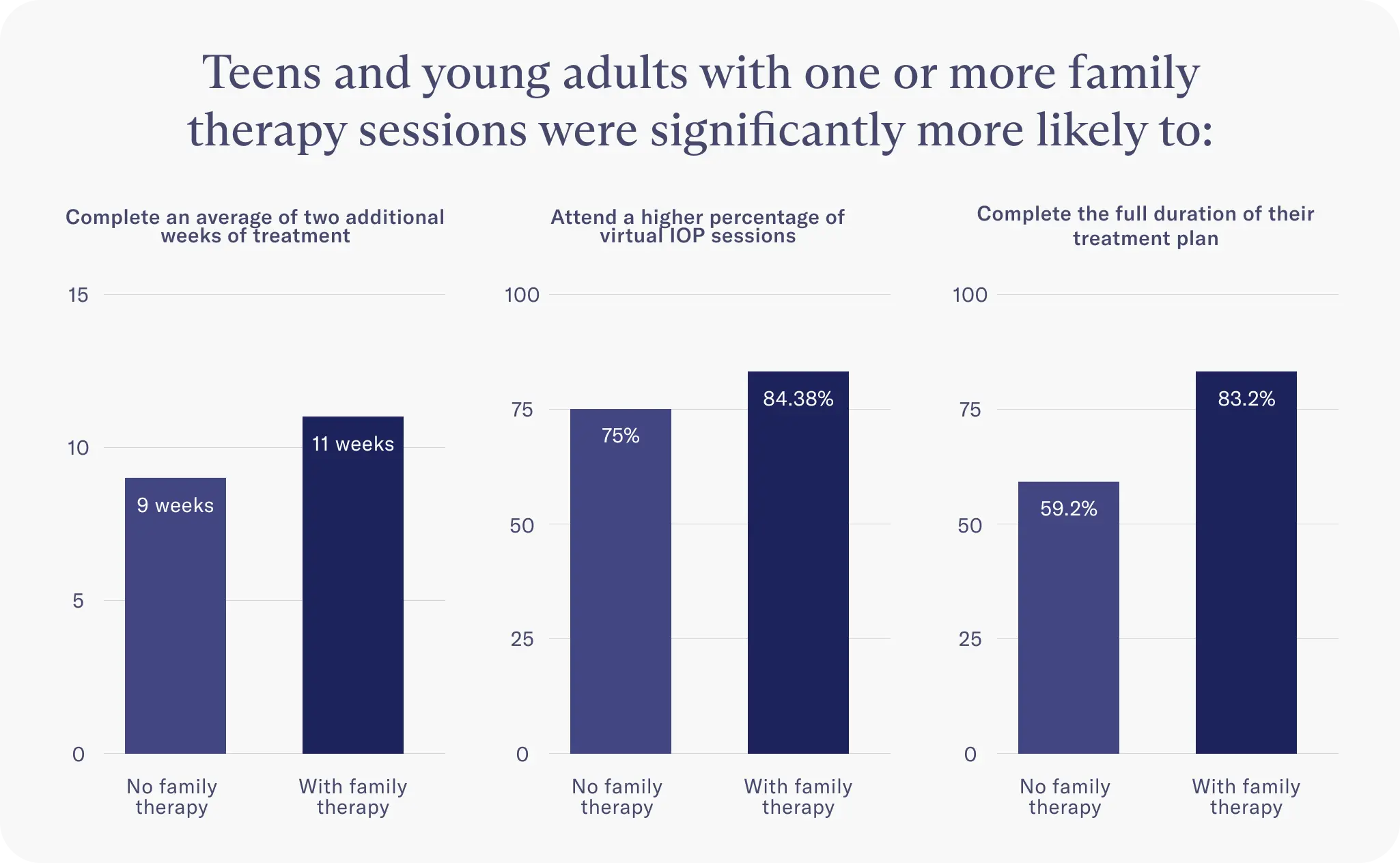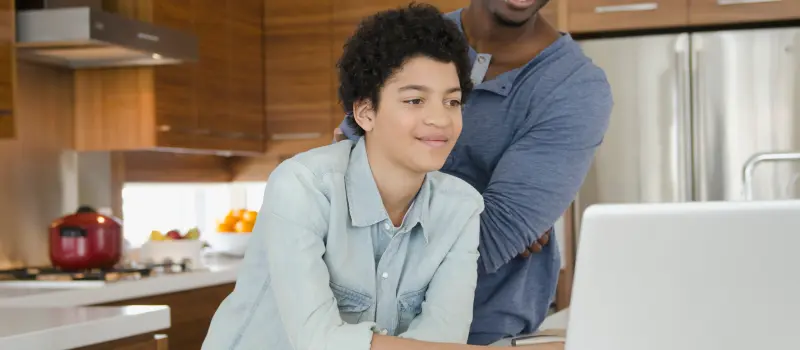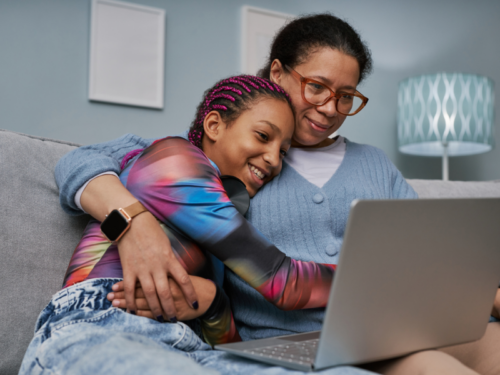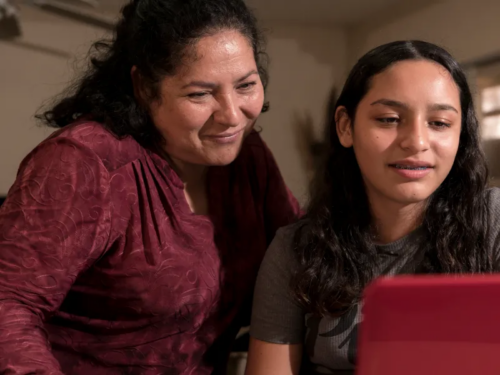
Table of Contents
New Research: Virtual Family Therapy Helps Youth Complete Mental Health Treatment

Written By: Alex Bachert, MPH

Clinically Reviewed By: Dr. Kate Gliske
May 23, 2023
4 min.
Meaningful family involvement is a powerful tool for encouraging teens and young adults to engage in virtual mental health treatment.
Learn more about our Clinical Review Process
Table of Contents
Most people are now aware that the U.S. is facing a youth mental health crisis, but a less commonly discussed issue is just how difficult it can be to ensure that people complete their recommended treatment. Research shows that as many as 28-75% of youth and young adults who seek mental health therapy drop out before completing the recommended dose of treatment, making it more important than ever to find ways to support treatment adherence and reduce dropout rates.
To better understand this issue, a team of researchers from Charlie Health, Florida State University, and the University of Minnesota studied the impact of participation in family therapy on youth and young adults who were enrolled in Charlie Health’s virtual Intensive Outpatient Program (IOP).
The results were promising: teens and young adults whose family members participated in their virtual treatment program had lower dropout rates and were more likely to complete treatment than those whose families don’t engage in their virtual care.
“This investigation highlights one of the many benefits of purposefully engaging parents and guardians in their adolescent or young adults’ high-intensity mental health care. Given that early treatment drop-out is linked to poorer downstream outcomes, it is important to identify any aspect of programming that can be bolstered or leveraged early on to ensure youth stay in treatment long enough to get an adequate dosage of the care they need,” said Dr. Kate Gliske, one of the study’s lead researchers. Below, we dive deeper into the study methods and results.
Join the Charlie Health Library
Get mental health updates, research, insights, and resources directly to your inbox.
You can unsubscribe anytime.
The study methods and findings
Although family engagement with in-person treatment has been linked to improved outcomes for teens and young adults, this was the first analysis to examine the effects in a virtual intensive outpatient therapy setting.
The team analyzed self-reported outcomes surveys and administrative data from nearly 1,500 teens and young adults who were discharged from Charlie Health’s virtual IOP between December 2020 and September 2022. All youth participated in 9 hours of therapeutic groups per week and had access to an optional one-hour individual therapy session and an optional one-hour family therapy session.
The researchers concluded that youth who participated in family therapy were more engaged in their treatment and were more likely to complete their virtual treatment compared with those who didn’t attend family therapy. Teens and young adults with one or more family therapy sessions were significantly more likely to:
- Complete an average of two additional weeks of treatment (11 versus 9 weeks)
- Attend a higher percentage of virtual IOP sessions (84.38% versus 75%)
- Complete the full duration of their treatment plan (83.2% versus 59.2% treatment completion rate)

The analysis also found that youth were 1.4 times more likely to complete treatment with each additional family therapy session that they attended. According to the researchers, there are several possible explanations for this finding.
“Family participation in therapy, as well as caregivers’ belief in the efficacy of treatment, is associated with increased rates of treatment completion for youth ... , as well as in studies of sexual abuse and trauma treatment specifically,” wrote the researchers. “Giving family members tools to understand the therapeutic process and its potential efficacy may improve the rates of treatment completion for youth.”
They also hypothesized that families who agree to attend family therapy are more likely to encourage their loved one to complete treatment and are willing to provide the financial and emotional support to help them do so. Another theory is that families who attend family therapy become more invested in the treatment plan and are committed to encouraging their loved one to complete their treatment.
Do you need more support with
your mental health?
Charlie Health can help.
What else should I know about family therapy?
Family therapy is a type of psychotherapy that addresses family conflict by improving communication skills between family members. While group and individual therapy help teens and young adults understand their specific mental or behavioral health issues, family therapy offers parents and teens a chance to learn how to communicate better and support each other.
Family therapy has two main goals:
- To come together as a group to support the family member who is living with a mental or behavioral health condition.
- To strengthen the entire family unit’s emotional health so that everyone has an opportunity to live a healthy, balanced life.

Family therapy helps people to develop new ways to communicate, improve family interactions, and navigate difficult situations as a team. It offers youth and their families valuable skills, such as learning how to:
- Set healthy and appropriate boundaries
- Improve communication skills and problem-solving strategies
- Cultivate empathy and understanding
- Reduce family conflict and improve anger management skills
- Overcome challenges and work toward goals
Explore family therapy with Charlie Health
Charlie Health provides high-quality, comprehensive mental healthcare to adolescents, young adults, and their families via individual psychotherapy, supported groups, and family therapy.
We believe that family involvement is one of the leading predictors of success in Charlie Health’s virtual Intensive Outpatient Program (IOP). Our family therapy component includes family support programming and teaches the skills to create a more supportive and healing home environment.
Our clinicians are trained in leading evidence-based family therapy sessions and have the opportunity to consult frequently with family therapy experts so that your family is always in the best hands. No matter where you are in your mental health journey, we're here to support you with a customized treatment plan based on your unique needs.





